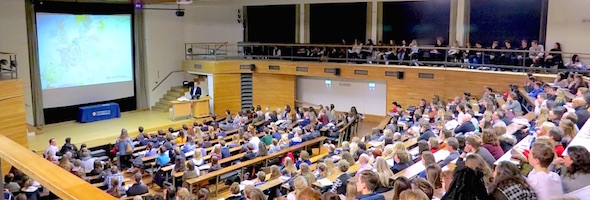The �������ϲʿ�����¼ system is unique, and we teach in many ways,��so you benefit from a rich combination of methods: from��the intimacy of small group 'supervisions',��to medium-sized seminar discussions, language classes, and larger��lectures. We are proud of our commitment to teaching, and love working��with our students as they develop their ideas.
Language classes
Most of our language classes are taught by native speakers. The Faculty arranges language classes, typically with 10-18 students, that develop your confidence to use the language, both in writing and speaking. We will look at grammar, syntax, idiomatic expression and your skills in translation, both to and from the language. In addition, you will have regular oral practice in smaller groups, typically in pairs.�� In your second year, you may well take an ‘audio-visual’ class in your post-A Level language, which will develop your comprehension skills in advance of the Year Abroad and provide an opportunity to engage with contemporary cultural issues. In your final year you will have classes in translation and a course on cultural issues focusing on identity.

Supervisions
For each of the courses you follow in literature, culture, history, and linguistics and for many language classes you will have regular (usually fortnightly) ‘supervisions’ in small groups,��typically in pairs.�� Supervisions are the unique hallmark of the �������ϲʿ�����¼ education. ��The supervisions are led by lecturers, professors,��and advanced PhD students who��specialise��in the area that you are studying – so you could find yourself discussing Baudelaire’s poetry or Nietzsche’s philosophy one-to-one with somebody who has just published a book on it. You will typically write a short essay for each supervision, which you will discuss, as well as considering the topic in general. For language supervisions you will be able to explore points of grammar, translation issues and idiomatic expressions in more detail. This is an exciting form of teaching: intensive, exploratory and led by you. It offers potentially the most stimulating kind of education there is.
Lectures and Seminars
The Faculty runs lectures which support your studies. Typically, there is a sequence of lectures (1-2 per week) for each course you follow.�� Some courses might use a mixture of lectures and seminars. Lectures provide background, signposts, models of critical approaches, and introduce you to new concepts and ideas. They are the beginning of your exploration of a given topic and do not provide ‘all the answers.’ Lectures will orient you in a topic and provide stimulation for your independent reading, study and thinking.
